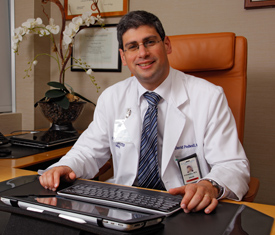There are few treatment options for the growing number of senior citizens with Alzheimer’s disease, but one Lake Success clinic is looking to help change that.
Neurological Associates of Long Island is one of 90 sites across the country participating in the Alzheimer’s STEADFAST Study, a 23-month trial of a new drug called Azeliragon that could help slow the progression of Alzheimer’s.
The practice, which treats thousands of Alzheimer’s patients from across Long Island, aims to have 20 participants enrolled in the national study of about 800 patients by the time enrollment closes early this year, said Dr. David Podwall, a physician at Neurological Associates.
“By participating it allows them to be proactive in the management of their own problem, but it also allows them to help the larger community, because we desperately need new medications to help these people,” Podwall said.
The study has been underway for about a year and is open to people who are at least 50 years old, have been diagnosed with mild Alzheimer’s disease and are already taking at least one existing Alzheimer’s medication, according to the STEADFAST Study website.
Half the participants are given Azeliragon to take with their existing medications while the other half are given a placebo.
No new Alzheimer’s treatments have been developed in the past decade, Podwall said, despite the fact that the memory-loss disease affects more than five million people in the U.S., according to the Alzheimer’s Association, a national research and advocacy nonprofit.
If approved by the Food and Drug Administration, Azeliragon could offer a new, more effective way of treating the disease, Podwall said.
Alzheimer’s usually develops through inflammation in the brain or the buildup of two proteins called A-beta and tau, Podwall said.
Existing treatments target one of those three factors, but Azeliragon binds to receptors in the brain and blocks all three, Podwall said.
Neurological Associates had to send Alzheimer’s patients to Manhattan for past drug trials, a heavy lift for them and their caretakers, Podwall said. But the STEADFAST study puts a new treatment right in their backyards, he said.
“We are now offering, hopefully, tomorrow’s treatment today,” he said.
Alzheimer’s disease has become “a huge burden to society” as the population of seniors grows, Podwall said, in terms of “both people and dollars.”
Some 390,000 New York seniors at least 65 years old had the disease in 2016, and that number is on track to grow to 460,000 by 2025, according to the Alzheimer’s Association.
It cost nearly $4.2 billion to care for those patients last year, the association estimates. And in 2015, more than one million caretakers provided more than $1 billion worth of unpaid care.
State lawmakers in recent years have pushed to fund more Alzheimer’s research and aid caretakers.
Gov. Andrew Cuomo introduced an initiative in 2015 to fund nonprofit groups that aid caregivers. Legislators also pushed that year for a public vote on a $1 billion bond to support Alzheimer’s research in the state, but the Legislature never approved that measure.
Anyone interested in participating in the STEADFAST drug trial can call Neurological Associates at 516-466-4700, ext. 140, to see if they qualify.



